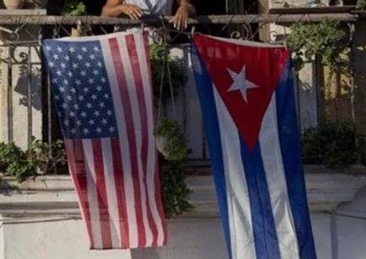
Juan Juan Almeida, 1 November 2017 — As of this November, Cubans will be able to do the paperwork to get a visa to travel to the United States in third countries. The application for an immigrant visa can be made at the United States consulate in Bogota, and for a non-immigrant visa at any US embassy outside Cuba.
The measure, taken in response to the sonic attacks, and which to some extent has as an objective to pressure the Cuban government with the removal of a great part of the US embassy personnel in Cuba along with the closure of certain consulate services, will increase the work of American officials and result in costs and travel inconveniences to Cuban families. But it will not upset the Castro leadership which, by the way, just a few days ago, announced a dodgy counterattack with spectacular effect.
An agreement signed on 4 November 1994 by his excellency Señor Pardo García-Peña, former Foreign Minister for the Republic of Columbia, facilitates visas for indeterminate times for Cubans who have a diplomatic passport.
The agreement, ratified on 27 October of that same year, by the former Cuban Foreign Minister Roberto Robaina, also allows that citizens who are holders of official passports will be allowed to enter Columbia either in transit or to remain in the country for up to 6 months.
The government of Cuba maintains a similar protocol with Belize, Bolivia, Dominican Republic, Ecuador, Guatemala, Guyana, Jamaica, Mexico, Nicaragua, Panama, Suriname and other 66 countries.
And this is normal. According to international treaties, diplomatic and official passports should be issued only to people who require them for matters of an official nature during their trip abroad. But what the advisers of the government of the United States apparently ignore is that the Ministry of the Interior (MININT), the Ministry of Foreign Affairs (MINREX) and a group of travel and immigration laws that have been very well designed by the government of the Republic of Cuba, delay the use of this type of documentation to a much wider group.
Decree 26/78, which regulates the use and issuance of passports in Cuba, authorizes the possession of a diplomatic passport to members of the Politburo and the Secretariat of the Central Committee of the Communist Party of Cuba, as well as a very long list of other other officials that includes: Members of the Central Committee of the Communist Party of Cuba; heads and deputy heads of departments, heads of sections and officials of the Central Committee of the Communist Party of Cuba; members of the Council of State; deputies to the National Assembly; members of the Council of Ministers; Presidents of Organizations of the Central State Administration that are not part of the Council of Ministers; General Secretary of the Cuban Workers Center; president and vice president of the Supreme People’s Court; Attorney General of the Republic; deputy prosecutors of the Attorney General’s Office; Judges of the Supreme People’s Court; first secretaries of the Provincial Committees of the Communist Party of Cuba; Presidents of the Provincial Assemblies of Popular Power; vice-presidents and vice-ministers of the Organisms of the Central State Administration; diplomatic and consular officials of the Republic, advisers and commercial, economic, cultural, press, military, air and naval attachés; officials of the Ministry of Foreign Affairs and Diplomatic Post; department heads of the National Assembly of People’s Power, of the Council of Ministers and its Executive Committee; advisers to the vice presidents of the Council of State and the Council of Ministers; advisers and officials of the Council of State, Council of Ministers and its Executive Committee, as well as their respective Secretariats; department heads of the Ministry of the Revolutionary Armed Forces and of the Ministry of the Interior; department heads of the Ministry of Foreign Trade and Foreign Investment and of the Central Bank of Cuba; delegates to International Conferences or intergovernmental or diplomatic conferences; and as many other officials of the Communist Party of Cuba, the State and the Government, the Minister of Foreign Affairs deems convenient and necessary for the full accomplishment of the entrusted missions; and, very especially, family members of the people listed above. And all this includes authorizing travel even if the trip is not for any official purpose.
Now, if the American intention, in addition to protecting its consular staff assigned to the embassy of Havana, seeks to encourage popular discontent on the island, I am sorry to say that the advisers, at least on the Cuba issue, are more confused than Don Quixote at a wind farm. Popular approval of the Cuban government has just been noted, with the official decision, already published, to eliminate the “authorization” of the passport for Cuban emigrants to Cuba; to allow Cuban citizens residing abroad to enter and exit Cuba on pleasure boats; to allow Cuban citizens who left the country illegally to enter Cuba; and tofacilitate the process so that the children of Cubans living abroad, born abroad, can obtain Cuban citizenship and an identity document. A measure that, incidentally, responds clearly to the current occasion in a theatrical way to show the “integrative” and conciliatory face of the government. It is no coincidence that it was announced at just the moment when the member countries of the United Nations (UN) are preparing once again to vote for or against the Embargo.
Cuba, as always, has an economic, political purpose and seeks to incite the exiled-emigrant pulse; but this time it has a sarcastic addition; repealing the infamous “habilitación” — the special permission now required for Cubans abroad to to return home — and to allow more family and nostalgia-related trips with affordable prices make an infallible convoy. Starting this coming January 1, instead of going out to spend a Saturday night on the town in Miami, it will be cheaper to spend the weekend in Havana.
